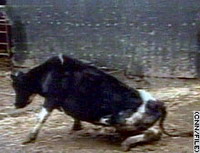Government to restrain meatpackers from testing for mad cow disease
The Agriculture Department tests fewer than 1 percent of slaughtered cows for the disease, which can be fatal to humans who eat tainted beef. A beef producer in the western state of Kansas, Creekstone Farms Premium Beef, wants to test all of its cows.

Larger meat companies feared that move because, if Creekstone should test its meat and advertised it as safe, they might have to perform the expensive tests on their larger herds as well.
A federal judge ruled in March that such tests must be allowed. The ruling was scheduled to take effect June 1, but the Agriculture Department said Tuesday it would appeal, effectively delaying the testing until the court challenge has played out.
Mad cow disease, or bovine spongiform encephalopathy, is linked to more than 150 human deaths worldwide, mostly in Britain.
Three cases of mad cow disease have been found in the United States. The first, in December 2003 in Washington state, was in a cow that had been imported from Canada. The second, in 2005, was in a cow born in Texas. The third was confirmed last year in an Alabama cow.
The Agriculture Department argued that widespread testing could lead to a false positive that would harm the U.S. meat industry. U.S. District Judge James Robertson noted that Creekstone sought to use the same test the government relies on and said the government lacked the authority to restrict it.
Subscribe to Pravda.Ru Telegram channel, Facebook, RSS!





